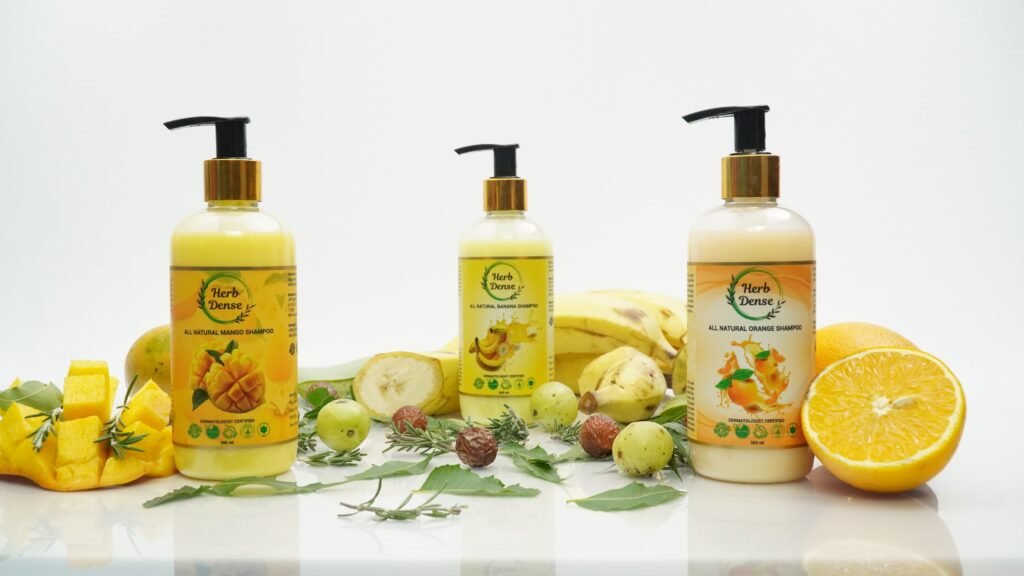In recent years, the beauty and personal care industry has seen a shift toward more natural, plant-based products. One such shift is the growing popularity of herbal hair shampoos over conventional commercial shampoos. While both types of shampoos are designed to cleanse the hair and scalp, herbal shampoos offer a range of benefits that many commercial shampoos cannot match. In this article, we’ll explore the advantages of herbal hair shampoos versus their synthetic counterparts, focusing on ingredients, scalp health, environmental impact, and long-term hair car
1. Natural Ingredients vs. Synthetic Chemicals
One of the main differences between herbal and commercial shampoos is the ingredients used. Herbal shampoos are typically made with plant-based extracts, essential oils, and natural botanicals like aloe vera, tea tree oil, chamomile, neem, and hibiscus. These ingredients are known for their healing, soothing, and nourishing properties, which can promote healthy hair and scalp.
In contrast, commercial shampoos often contain synthetic chemicals, such as sulfates, parabens, silicones, and artificial fragrances. These substances are used for their foaming properties, preservation, and scent, but they can strip the scalp of its natural oils, causing dryness, irritation, and long-term damage to both the hair and scalp.
2. Gentler on the Scalp and Hair
Herbal shampoos are typically milder than commercial shampoos because they do not contain harsh chemicals. This makes them ideal for individuals with sensitive skin, dry scalps, or conditions like eczema or psoriasis. The natural ingredients in herbal shampoos can help soothe irritation, reduce inflammation, and prevent flakiness. For example, aloe vera is known for its hydrating properties, while tea tree oil can combat dandruff and promote a healthy scalp.
Commercial shampoos, on the other hand, can sometimes cause scalp irritation due to their high chemical content. Sulfates, for example, can strip the scalp of its natural oils, leading to dryness and increased production of oil as the scalp tries to compensate. This can create a vicious cycle, where the more you use commercial shampoo, the more you damage your hair and scalp.
3. Long-Term Hair Health
Herbal shampoos are designed to nourish and strengthen hair from the roots to the tips. Many herbal shampoos contain vitamins and minerals that promote hair growth, reduce hair loss, and improve hair texture. Ingredients like biotin, keratin, and bhringraj (an Ayurvedic herb) can help improve hair health over time.
Because commercial shampoos often contain harsh chemicals that can weaken hair follicles and damage the cuticle layer, they may offer short-term cleanliness but can lead to hair thinning, breakage, or dullness in the long run. Furthermore, many commercial shampoos may contain silicones that coat the hair, giving it a shiny appearance but potentially leading to buildup and making the hair appear limp over time.
4. Eco-Friendly and Sustainable
Another compelling benefit of herbal shampoos is their environmental impact. Most herbal shampoos come in biodegradable packaging, and many brands are committed to sustainability by using organic ingredients, reducing plastic waste, and avoiding animal testing. Additionally, the ingredients used in herbal shampoos are often sourced from renewable plants and herbs, making them a more eco-friendly choice compared to the petroleum-based derivatives found in many commercial shampoos.
Commercial shampoos, especially mass-produced ones, often rely on non-biodegradable plastics for packaging and use synthetic chemicals that can pollute water sources when washed off. These shampoos may also contribute to larger environmental concerns, such as deforestation and pesticide use in the production of non-organic ingredients.
5. Free from Harmful Additives
Many herbal shampoos are free from potentially harmful additives, such as parabens, sulfates, phthalates, and synthetic dyes. These chemicals are commonly found in commercial shampoos and have been linked to various health concerns, including hormonal imbalances, allergic reactions, and long-term toxicity. By choosing herbal shampoos, consumers can avoid exposing themselves to these substances, opting for a safer, more natural alternative.
Conclusion
While both herbal and commercial shampoos have their place in hair care routines, the benefits of herbal hair shampoos stand out when considering long-term health, gentleness, and sustainability. With their natural ingredients, ability to nourish and protect the scalp, and commitment to eco-friendly practices, herbal shampoos offer a holistic approach to hair care. For individuals seeking healthier, more sustainable options for their hair, herbal shampoos provide a safe and effective alternative to conventional products laden with synthetic chemicals.

